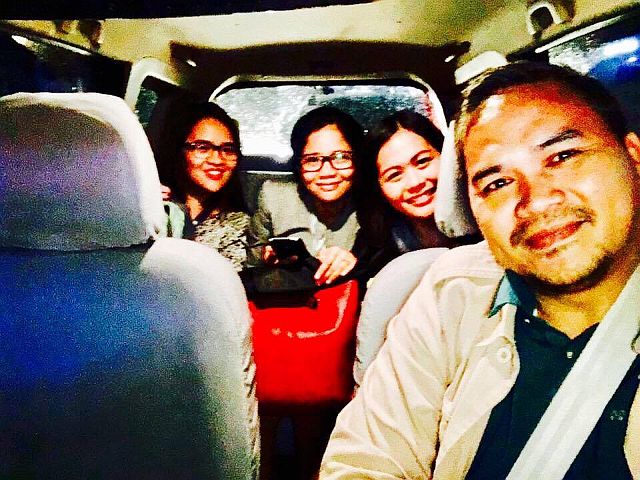
Albert Montanez (left), a satisfied Wunder driver, is with his carpool passengers in one of his trips to work at the Cebu Business Park.
CONTRIBUTED
WUNDER Carpool would have been a welcome addition to Cebu’s thriving app-based transport services if not for an order from the Land Transportation Franchising and Regulatory Board (LTFRB) for them to cease operations.
LTFRB, in a statement, said Wunder and one other app-based transport service have yet to meet government requirements.
The board cited their failure to coordinate with the agency in order to be accredited as TNCs or transport network companies.
Wunder was launched in Cebu this month following its launching in Manila last February 2016.
Driver
Albert Montanez drives a 7-seater MPV Suzuki Ertiga to work every day, with the seats always left unfilled on his way to work and back.
That was until the 46-year-old Management Information System (MIS) head discovered Wunder, which allowed him to share his car with others.
Montanez learned about Wunder, a carpooling mobile application, on social media and decided to give it a try last January 13 this year.
“The concept of sharing your car in almost a regular basis with the public, particularly with the working class, is a very noble idea. That means less cars on the street, which means less traffic, less fumes, and that’s helping our environment in a way,” he said in an interview with Cebu Daily News on Facebook.
Montanez, married and a father of one, lives in Lapu-Lapu City with his family and goes to work in Cebu Business Park in uptown Cebu City.
Montanez said the experience had been promising and hoped to try Wunder as a rider as well.
“I have riders with cars who left their vehicles at home. Imagine if we can multiply that. How many cars can we take out of the streets, lessening the traffic and fumes? I say it should be supported by the government,” he said.
However, he said that he will have to stop for now until the issue with the LTFRB is resolved.
Wunder COO
Wunder chief operating officer Sam Baker said in an email to CDN that they would exert all efforts to coordinate with the LTFRB and explain how the platform really works.
Baker said that Wunder was launched in Metro Manila in February 2016.
He claimed that within 10 short months, the Wunder community grew to over 200,000 riders and drivers, and there were over 1,000,000 rides given.
Unlike other ride-haling apps that the public are more familiar with, Wunder drivers are into the carpooling venture not to earn profit but only as a way to cover their vehicle’s fuel and maintenance expenses.
He said the Wunder drivers don’t work on 8-to-10-hour shifts to wait for passengers unlike those in other app-based transport service providers.
“We are focused on car owners who drive their car to work every day and then back home. These are people with full-time jobs in offices who enjoy sharing empty seats once or twice a day,” he said.
The most popular professions among Wunder drivers are those working in information technology, engineering, financial services, and management.
Riders
On the other hand, passengers need to be more flexible as Wunder vehicles are not taxis.
Baker said they might be asked to coordinate for a more convenient pick-up location or a time that works best for all others sharing the ride.
Drivers accept a partial reimbursement of their costs from passengers and cannot make a profit.
Wunder was established in Germany, and is now operating globally.